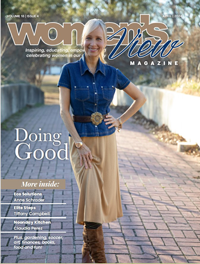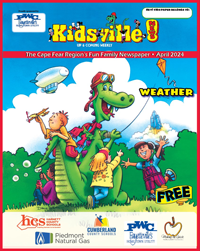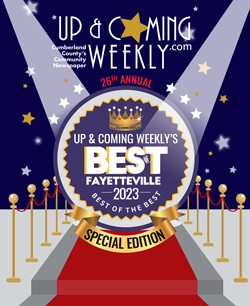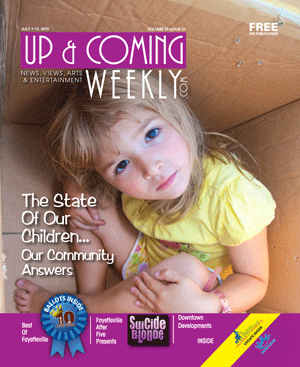 Being a kid can be a really tough job, even in the best of circumstances, nevermind
the heart break and tragedy that so many of them live with every day. When kids are
neglected, abused and hurting they don’t have the tools they need or access to the
information that can change their lives. That is why it is so important that there are places
they can turn to for help and people looking out for their best interests. In this fi rst part of
a continuing series, we explore some of our community organizations that are making a
difference in children’s lives in Cumberland County. The exploration will continue in our
Being a kid can be a really tough job, even in the best of circumstances, nevermind
the heart break and tragedy that so many of them live with every day. When kids are
neglected, abused and hurting they don’t have the tools they need or access to the
information that can change their lives. That is why it is so important that there are places
they can turn to for help and people looking out for their best interests. In this fi rst part of
a continuing series, we explore some of our community organizations that are making a
difference in children’s lives in Cumberland County. The exploration will continue in our
July 21 issue. The Child Advocacy Center deals in some pretty grim situations. In fact, according to their Web site:
• Child abuse is a community health epidemic with long-term consequences for the child, the family, the community, and society.
• Every 35 seconds a child in America is confirmed as abused or neglected.
• Every six hours a child in America is killed by abuse or neglect.
• One in four girls and one in six boys will be sexually abused before their 18th birthday.
• Cumberland County has the third highest number of child abuse cases reported (4,923 in FY 04-05), the second highest number of cases substantiated (1,512 in FY 04-05) and the highest number of homicides from child abuse in NC (5 in 2004).
• There are 386 sex offenders in Cumberland County registered with the NC Sex Offender Registry. (Actual number of sex offenders is generally thought to be 3 times higher than registered numbers).
While these numbers are discouraging and even daunting, make no mistake, the Child Advocacy Center is there fi ghting for kids and working to protect them when it is hard for the youngsters to understand or even talk about what they have been through — much less defend themselves — and they are just one of many organizations that seek to better the lives of children.
“Children that come through here have a pretty good safety net that is put in place for them,” said Roberta Humphries, executive director of the Child Advocacy Center in Fayetteville. “We help to facilitate the beginning stages of healing for that child. We have a forensic interviewer who is trained to conduct those interviews with children in a noninvasive non-threatenting and non-suggestive manner. That makes a big difference for the child.”
The Child Advocacy Center, by their own defi nition, “is a child-friendly place where a multidisciplinary team of community professionals join hands to care for abused children. They aim to decrease the overall impact of abuse by reducing further victimization to abused children; by increasing the number of successful prosecutions of perpetrators; by encouraging parents and caregivers to stop abusive and neglectful behaviors; by reducing the long-term costs to society; and by decreasing the number of child abuse victims through awareness and prevention education.”
In order to make interviewing children and information gathering more effi cient in child abuse cases, the Child Advocacy Center “brings together representatives from CC Department of Social Service’s Child Protective Services; CC Sheriff’s Offi ce; Fayetteville Police Department; Hope Mills Police Department; Spring Lake Police Department; the medical community via Southern Regional Area Health Education Center, Cape Fear Valley Health Systems and Womack Army Medical Center; CC District Attorney’s Offi ce; Guardian ad Litem; and Rape Crisis Volunteers of Cumberland County.”
Instead of having to retell/relive their experiences over and over and suffering through endless interviews, more information is gathered in fewer sittings, giving children a faster start on the road to healing, and saving both families and organizations precious time in building cases against those who seek to harm the most vulnerable among us.
Helping families and children to deal with abuse is just part of the equation though, education is also key in detecting and preventing abuse in our community. The Child Advocacy Center provides ongoing education to the organizations that partner with them, they review cases weekly, provide Continuing Education opportunities to organizations and professionals in the community and provide child abuse awareness and prevention information to the community.
“Often people don’t know or don’t understand the impact of their actions on children, take shaken baby syndrome for example, some people just don’t understand how much trauma that causes,” said Humphries. “Unfortunately, whenever families face stressors, child abuse numbers go up whether it is a deployment or unemployment or who knows what. A lot of times it is just a matter of educating people and giving them the tools they need — like anger management skills that can make a difference.”
For more information, to make a donation or to volunteer visit www. childadvocacycenter.com or give them a call at 486-9700.
Fayetteville Urban Ministry: Finding Friends
by STEPHANIE CRIDER
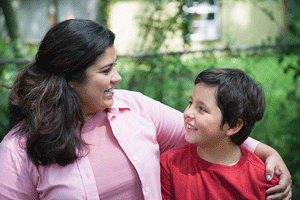
Fayetteville Urban Ministry’s whole purpose is to show God’s compassion for its neighbors. They do this through several programs: Emergency Assistance, Adult Literacy, Find a Friend and the Nehemiah Project.
These are all practical programs that change lives for the better — and whether it is through direct services from Fayetteville Urban Ministry or the trickle down effect, the work that these folks do day in and day out, the dedication they show to their cause through out the year has an impact on young lives.
The adult literacy program teaches basic reading, writing and math skills to adults who read below a sixth grade level. Volunteer tutors work one on one with the students. The facility has a library, computer lab and a learning room for students and tutors to use. While this particular program is for adults, imagine the benefIts that a young child receives in having a literate adult in their lives. Everything from bed time to the kind of job the adult can get changes.
Ah, home sweet home — but how sweet is it really when rain or pine needles are falling through the roof, or the light fixtures are falling out of the ceiling or the floor has rotted away beneath you? Qualified contractors, volunteers and staff with the Nehemiah Project repair homes for moderate to low income home owners. According to www.fayurbmin. org/programs, last year this program performed repairs worth $120,547! Having a safe place to call home can make all the difference in the lives of youngsters and this program provides that.
Food and clothing are pretty basic needs, but sometimes parents are unable to provide this for their families. Fayetteville Urban Ministry provides emergency assistance where clients are able to shop at no cost for things like clothes, linens, and hygiene kits at no cost. Emergency food assistance is also available for families in crisis.
The Find a Friend Program is all about helping kids though. It focuses on pairing up youth with mentors and resources to make smart decisions and set them up for successful lives as adults. By helping youngsters to channel their energy constructively, develop a healthy respect for learning, improving social interaction skills and high self esteem Find a Friend helps the court system keep kids in positive, productive lifestyles.
“We have been in existence since 1982, so we have turned around a lot of lives,” said Shauna Hopkins, Fayetteville Urban Ministry after school coordinator. “We currently have about 120 youth in the program but we serve almost 300 kids a year and our services are free of charge for the youth enrolled in our program.”
According to Hopkins, Find a Friend has four different parts to it. The interpersonal skills part works on things like kids’ social skills, behavioral problems, anger management and peer pressure.
“We also have our Beyond program which is building youth opportunities and destinies,” said Hopkins. “That is focused on gang intervention and gang prevention — we target certain areas in the community to help those kids out to stop them from being in a gang.”
The one on one mentoring component helps any at risk youth get a mentor like a big brother or big sister. There is also a mentoring program for children of incarcerated parents. “All the programs work together hand in hand to provide wrap around services for the youth we serve,” said Hopkins. “We serve the entire Cumberland County area and we serve ages six through 17 so we are pretty strung out most of the time,” she added with a laugh.
Not only does Hopkins get to work for an organization that makes a difference in the community, she builds relationships with the youth that come through the programs — and she loves it.
“The kids are the best part of my day,” said Hopkins. “I do it for them. Every time I see them I am reminded why I go thorough all the paper work and the meetings and all that stuff. I have said for many years that children are our best natural resources and we need to nurture them because they are the future they are going to be running the country one day”
To find out more about Fayetteville Urban Ministry, make a donation or referral, or to volunteer check out www.fayurbmin.org/ or call 483-5944.
Boys & Girls Club: Teaching a Positive Life
by ASHLEY YOUNG
With a mission to inspire all youth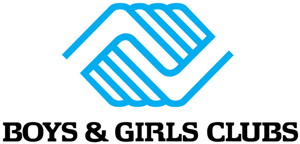 to become productive, responsible and
caring citizens the Boys and Girls Club of Cumberland County strives to be a place
where kids can be themselves, have fun with other kids their age and participate in
structured activities, including basketball, softball, fl ag football and a game called
“quickball.”
to become productive, responsible and
caring citizens the Boys and Girls Club of Cumberland County strives to be a place
where kids can be themselves, have fun with other kids their age and participate in
structured activities, including basketball, softball, fl ag football and a game called
“quickball.”
“It’s an after school program for youth ages 5-18 that teaches health and life skills, character and leadership development education and career development, sports, fi tness and recreation and the arts,” said Don Williams, Chief Professional Offi cer for the Cumberland County Boys and Girls Club.
Along with physical activities the club also implements a daily program called “Power Hour” which is a homework and tutorial enterprise to encourage kids to stay focused in school. Other programs include “Passport to Manhood,” for male children 11-14 years old, which encourages them to use responsibility and reinforces positive behavior, and “Street Smarts” which teaches kids to resist gangs and violence and resolve confLict in a peaceful manner.
The Boys and Girls Club was started by two gentlemen in 1968 because of the need for kids to have something positive to do after school, with juvenile crime on the rise. The club has been in service now for more than 42 years and four are open throughout Cumberland County. Their hours are from 2 p.m. until 6 p.m., Monday through Friday during the school year, and 7:30 a.m. until 6:30 p.m. during the summer. Parents can make their children members by fi lling out an application at any Boys and Girls Club.
The Cumberland County Boys and Girls Club welcomes kids of any gender, religion and race to come out and join the club. Scholarships are given to the kids so their membership is free. Many of the kids who spent their early years at the Boys and Girls Club have gone on to achieve academic success and many have joined the military. Donors and volunteers are welcome and with a faculty of one staff member per 20 kids, volunteers are needed.
“I think it’s a great program that really helps kids and the community and there is so much kids can gain by being part of a Boys and Girls Club. I’ve been involved for 21 years,” said Williams.
The Cumberland County Boys and Girls Club is located on 3475 Cumberland Road in Fayetteville and can be reached by phone at (910) 425-3852. For more information please visit ccbgc.org.
Ashton Woods: It Takes a Village
by ASHLEY YOUNG
Sixteen years ago the Cumberland Interfaith Hospitality Network recognized the need for temporary housing for homeless families and their children in our community. In 1997, the Cumberland Interfaith Hospitality Network along with The Women’s Center of Fayetteville and many private citizens created a dream which became the reality of Ashton Woods Transitional Housing Village.
The village is a small community of 20 homes located on the corner of Bragg Boulevard and Old Shaw Road that was created for homeless families who need more time to get back on their feet than traditional shelters allow.
The Women’s Center of Fayetteville led in fundraising efforts and accepted the
property deed. Nearly half a million dollars was raised and the property of Ashton
Woods was purchased. The Cumberland Interfaith Hospitality Network helped in
funding efforts and secured other grants and donations towards this program.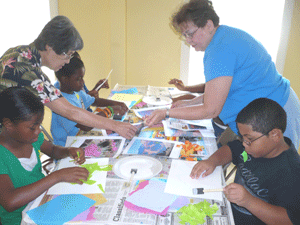
They also coordinated volunteers, managed the Ashton Woods property and worked with the families in need. Through this they were able to get hundreds of volunteers in the local community to help restore the homes and build a security fence around the village in order to prevent crime. Church youth and adult groups cleaned out and painted homes to prepare them. The City of Fayetteville provided funds to the Fayetteville Urban Ministries to help assist with the electrical, plumbing and HVAC repairs on eight of the houses. Ashton Woods offi cially opened in June of 1998.
Families who live within the Ashton Woods community are provided with a two bedroom home and may live there for two years. The families are responsible for paying utility bills including water and sewer, heating, water heater and electricity bills. Rent of the houses is subsidized during the families’ stay in order for them to work on specific goals to help increase their wage earning potential. These goals include completing GEDs and college, earning certifi cate programs, such as forklift driving, getting certified nursing assistance, etc. Subsidy is provided due to the fact that each family is expected to obtain employment, while accomplishing these goals, however payment for part time jobs is often limited, yielding around $200 per week, which is not enough to pay traditional rent.
Each family that lives within Ashton Woods participates in an intensive care management program which establishes a savings requirement to help prepare them for the move to permanent housing at the end of their stay. A spending budget is established to verify that all household income is being used to pay residents monthly utilities, pay debts that are owed and save remaining income for permanent housing goals.
“Our organization has a professional team which works with each family establishing goals, tracking progress, verifying their fi nancials, bank statements and daily household expenditures,” said Denise Jiles, Project Director of the Cumberland Interfaith Hospitality Network.
There are also services and support offered to children who have experienced signifi cant trauma due to their family’s housing instability. Also a fully functional library with over 2000 reading and reference resources, computers, tutors, and educational activities are provided so each child has the support necessary to continue their education and establish goals to keep them on the right track.
Another program for the kids is that every 18 months in the Ashton Woods program, kids choose a community project that they work for in order to make a positive difference. Last year they chose the Cumberland Community Foundation where they raised resources for painting the Cumberland Community resource room. The children worked throughout the year to obtain paint supplies and other needed materials.
“I believe this is one of the best programs for families experiencing homelessness in our state. It has been an essential part of recovery in the lives of hundreds of homeless children and their parents. I am proud to be a part of developing self suffi ciency in the lives of so many and hope that the impact we have continues to help our community in reducing dependency on public programs and eliminating homelessness one family at the time,” said Jiles. For more information, visit www.cumberlandihn.org/AshtonWoods.htm.
Branching Out, Making
a Difference
by DR. SHANESSA FENNER
Great Oak recognizes and wants to address the socioeconomic issues among inner city male youth in educational achievement, juvenile incarceration, and joblessness and access to opportunities.
“Great Oak held a two-week leadership and development summer camp in June,” said Bobby Washington, executive director of Great Oak Youth Development Centers. “It entailed a theory being taught in the morning followed by a fi eld trip or other community service event in the afternoon.” Washington added that the youth were shown business plans and taken to various businesses that have been planned and executed. The camp also focused on teaching the youth about successful teamwork, respect for themselves and others, and how to bring out a positive self-image. The culminating activity of the camp consisted of the youth creating a business plan and presenting it to others.
Great Oak provides services to students aged 6 to 18. Parents, educators, or community offi cials must refer the students. The mission of Great Oak Youth Development Center is to provide a foundation for achievement and success among male youth within targeted communities by directly providing educational assistance, mentoring, leadership and skills training and cultural awareness activities. The defi cit is more pronounced and alarming for America’s black males.
The programs offered are Effective Black Parenting, Men and Boys Unity, Mentoring, Leadership Academy, Parental Involvement, Summer Leadership and Entrepreneurs’ Camp, and Reading Buddies. Great Oak was recognized by the governor for North Carolina’s Volunteer Service Medallion Award and recognized by the Fayetteville Business and Professional League as the Social Entrepreneur of the Year.
“It is our goal to expose the boys to education and cultural events,” said Washington. “We always work a college or university fi eld trip in when we take an extended field trip.”
Great Oak is a charitable nonprofi t organization that relies on donations for a
substantial portion of funding to run their program. Applications may be requested

 How to resolve AdBlock issue?
How to resolve AdBlock issue? 





